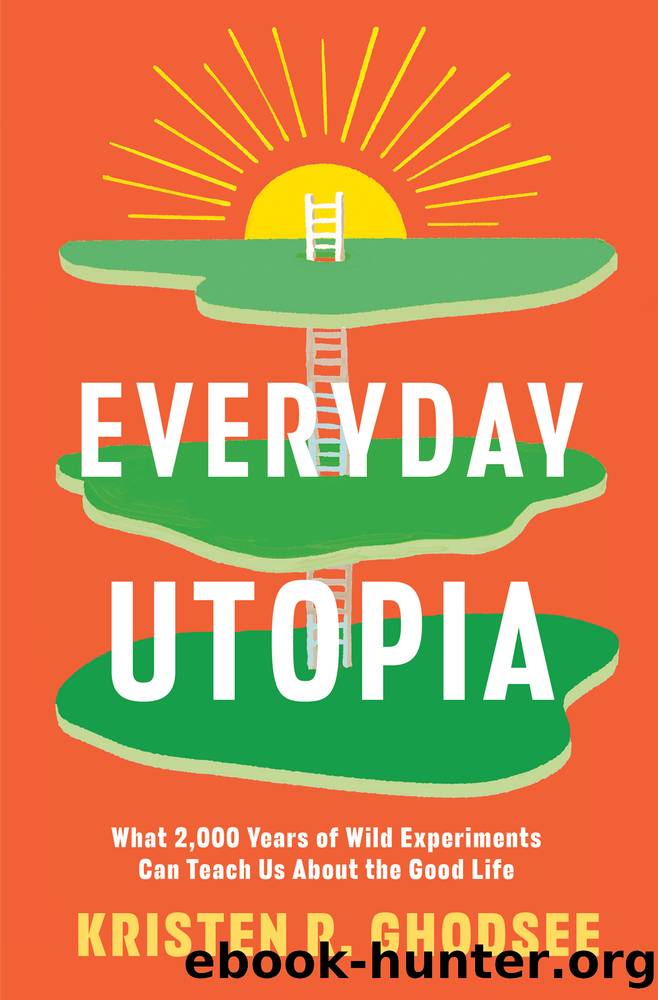Everyday Utopia by Kristen R. Ghodsee

Author:Kristen R. Ghodsee
Language: eng
Format: epub
Publisher: Simon & Schuster
Published: 2023-05-16T00:00:00+00:00
Is the Nuclear Family a Mistake?
I recall these incidents with some trepidation; when I was growing up, these werenât the kinds of details you discussed with strangers. I share my own story here only to emphasize that the problems of the family are not merely an abstract theoretical consideration for me, but something I experienced in my own life and something that is still pervasive throughout all of our societies. Although there are more laws against, and far greater awareness of, domestic violence today, the problem persists behind the many closed doors of homes around the world. The lockdowns imposed by COVID-19 exposed the ubiquity of what UN Women called the âShadow Pandemic,â the significant rise in domestic violence when women and children were forced to isolate with abusers in single-family homes.2 Even before 2019, UN Women estimated that a third of all women globally suffered from physical or sexual violence at the hands of an intimate partner (often called intimate partner violence, or IPV) in their lifetimes. In the United States, the Centers for Disease Control estimated that 25 percent of women and 10 percent of men were victims of IPV in 2018 alone.3 Despite heroic efforts to staff hotlines and build shelters, the black box of the nuclear family can provide cover for horrendous levels of abuse and neglect.
Even in the absence of physical violence, the idealization of the nuclear family obscures the occasionally crushing demands of parenting. Some adults stumble into parenthood by mistake, but even the most well-meaning mothers and fathers can struggle with the massive responsibility of raising children in a society that provides little support. Since most US states consider child abandonment a felony crime, some parents grow to resent their children, and this is not including the mothers with postpartum depression discussed in chapter 3. To understand the desperation that some mothers and fathers feel, consider what happened in 2008 when the state of Nebraska passed a unique âSafe Havenâ law designed to protect children from overwhelmed parents.
âSafe Havenâ laws prevent infanticide by allowing new-born babies to be dropped off legally and anonymously, often at hospital emergency rooms. Most states place a thirty-day age limit on the children eligible for surrender, but Amanda McGill Johnson, the Nebraska legislator who proposed her stateâs new law, deliberately left this limit off. âWeâd seen nationally a mother who drowned her kids in a bathtub because she was depressed. And, so, in our minds, why should only infant life be protected?â Johnson told the Canadian Broadcasting Corporation in 2017.4
No one was prepared for what happened next. In the 120 days after the lawâs passage, a total of thirty-five older children, most between the ages of ten and seventeen, were dropped off at hospitals across the state.5 According to a social worker at one of the hospitals in Omaha, some parents walked their older children in and explained their mental health or behavioral issues before leaving them in the care of the staff. Other parents deposited their kids at the emergency room entrance and drove away.
Download
This site does not store any files on its server. We only index and link to content provided by other sites. Please contact the content providers to delete copyright contents if any and email us, we'll remove relevant links or contents immediately.
| Anarchism | Communism & Socialism |
| Conservatism & Liberalism | Democracy |
| Fascism | Libertarianism |
| Nationalism | Radicalism |
| Utopian |
The Secret History by Donna Tartt(16658)
The Social Justice Warrior Handbook by Lisa De Pasquale(11494)
Thirteen Reasons Why by Jay Asher(7801)
This Is How You Lose Her by Junot Diaz(5799)
Weapons of Math Destruction by Cathy O'Neil(5046)
Zero to One by Peter Thiel(4834)
The Myth of the Strong Leader by Archie Brown(4795)
Promise Me, Dad by Joe Biden(4455)
Beartown by Fredrik Backman(4433)
Stone's Rules by Roger Stone(4422)
How Democracies Die by Steven Levitsky & Daniel Ziblatt(4413)
The Fire Next Time by James Baldwin(4350)
100 Deadly Skills by Clint Emerson(4085)
A Higher Loyalty: Truth, Lies, and Leadership by James Comey(4039)
Rise and Kill First by Ronen Bergman(4020)
The David Icke Guide to the Global Conspiracy (and how to end it) by David Icke(3891)
The Farm by Tom Rob Smith(3878)
Secrecy World by Jake Bernstein(3788)
The Doomsday Machine by Daniel Ellsberg(3737)
